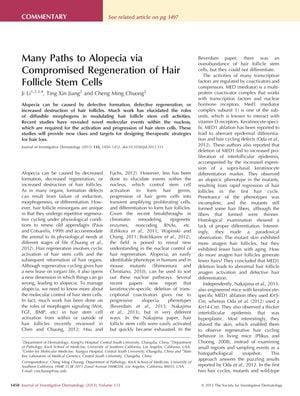Many Paths to Alopecia via Compromised Regeneration of Hair Follicle Stem Cells
May 2013
in “
Journal of Investigative Dermatology
”

TLDR Different problems with hair stem cell renewal can lead to hair loss.
The document from 2013 discusses the role of compromised hair follicle stem cell regeneration in causing alopecia. It reviews studies that have identified key molecular events in the nucleus that are critical for hair stem cell activation and progression. One study highlighted the importance of transcriptional coactivators, showing that deletion of MED1 in keratinocytes caused hair follicle regression and alopecia due to stem cell exhaustion. Another study found that overexpression of the Hippo pathway coactivator YAP expanded the hair follicle stem cell compartment but inhibited the formation of hair germs, leading to alopecia. These findings emphasize the significance of nuclear events and transcriptional coactivators in hair follicle stem cell function and suggest that their dysregulation may result in hair loss. Understanding these mechanisms could lead to new treatments for alopecia.














